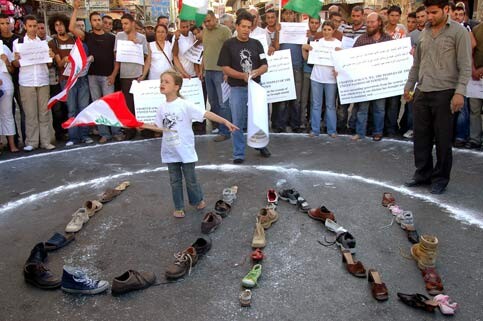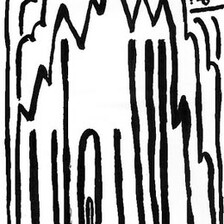The Electronic Intifada 12 August 2006

Palestinians demonstrate against the Israeli raid into Lebanon and Gaza in the West Bank city of Ramallah, 9 August 2006. (Maan Images/Mushir Abdelrahman)
Several Arab officials intimated after the unanimous UN Security Council vote for resolution 1701, intended to stop Israel’s unjust war on Lebanon, that it was time to build on this rare Arab “diplomatic triumph” by reopening the file of the root cause of the Arab-Israeli conflict, the question of Palestine. This logic is faulty and imprudent, despite all its luring appearance. Not every old man with a white beard is wise, after all.
Most Arabs, Palestinians included, have vied for years to snatch the Palestine question away from U.S.-Israeli clenching claws and return it to where it formally started: the United Nations. From their perspective, so long as the U.S. is allowed to control “99% of the cards,” as the late Egyptian president Anwar Sadat notoriously believed, there is no chance for a just and enduring peace. That much has become obvious to most. However, the UN of yesteryear is not the same organization we have today. The new realities of a unipolar world have abrasively reflected themselves in the US-imposed positions and interventions of the international organization, more than in any other “theater of operations.” Increasingly, Arabs along with many in the global South view the UN, especially its all-powerful Security Council, as little more than a tool of American hegemony. This bitter dismissal of the UN, though exaggerated, is amply justified by its record since the collapse of the Soviet Union.
Not that the UN in the bipolar phase was ever a sincere representative of the common interests of the world’s nations, but at least the cold war between the two dominant blocs allowed weaker nations some room for maneuver, for fighting for their rights and occasionally attaining them. With hindsight, those were the good old days, as gloomy as they seemed at the time. Ironically, a world under the continuous threat of nuclear annihilation from two opposing, more or less equivalent powers, experience tells us, is a far more secure and peaceful place than a world subjugated to the whims of a single, fat, ruthless and criminal empire intent on trampling international law and monopolizing the use of force worldwide to further its dominion and control of world resources. With the U.S. in effect controlling the UN, and in the lamentable absence of any viable, alternative international forum capable of arbitrating and settling conflicts as well as maintaining a reasonable level of world peace and stability, nations of the South are compelled to create new, evolving and effective means of resistance and solidarity that take into consideration contemporary conditions in striving to wrest control of the world’s fate from the bloody hands and the demented minds of the new Rome and its no less hubristic partners. The frantic processes that led to the latest UN resolution on Lebanon may give some insight into one, some say unique, way of doing just that.
The first draft of the US-French UNSC resolution looked very much like a “declaration of surrender” of the Arab side, as a discerning Hizbullah official commented. “If this is what they’re suggesting after Israel lost the military confrontation, what would they have proposed if Israel had won?” asked the witty speaker of the Lebanese parliament, Nabih Berri, echoing a widely held view among Arab and international observers alike. Only a few days after that draft was first made public the text underwent dramatic changes to the extent that its final version was seen by many, with some embellishment, as a declaration of Hizbullah’s victory over Israel. What on earth could have compelled America’s most undiplomatic, arrogant and viceroy-ish ambassador to the UN to make such an uncharacteristic U-turn? While Arab officials on the delegation that negotiated the outcome are likely to take credit for their claimed deftness and newly discovered diplomatic skill, the truth is that this relative triumph was created on the ground in South Lebanon, from Bint Jbail to Aita ash-Shaab and Khiyam, where the able Lebanese resistance inflicted upon the Israeli invading forces in less than a week massive losses including tens of destroyed or impaired fortified tanks and other armored vehicles, a badly damaged state-of-the-art military vessel and dozens of dead soldiers, quite a few among them from the army’s elite units. The radical shift of the balance on the ground in Hizbullah’s favor, the political steadfastness in Beirut and the resulting loss of direction and embarrassing wobbling among Israel’s political and military leaders together painted a picture of what can be accurately perceived as the very first Arab military victory over Israel’s much feared, “unbeatable” army.
Through its breathtaking streak of military successes in preventing Israel from attaining any of the declared objectives of its massive assault and by overwhelmingly winning the hearts and minds of the Arab, Muslim and other publics, Hizbullah managed to turn the tables at the political and diplomatic levels.
The collapse of Israel’s famed “power of deterrence” on the ground in Lebanon and on the air in Al-Jazeera’s scrupulous and unparalleled broadcasts reaching tens of millions of Arabs directly translated into a decline in US resolve at the UN to maintain its defiance of world public opinion — including a noteworthy minority among Americans — or to keep up the fight for a foolishly prejudiced resolution that came across as preposterously detached from reality, having been premised on an imaginary Israeli military accomplishment that never materialized. Through its breathtaking streak of military successes in preventing Israel from attaining any of the declared objectives of its massive assault and by overwhelmingly winning the hearts and minds of the Arab, Muslim and other publics, Hizbullah managed to turn the tables at the political and diplomatic levels.
The previously complicit French leadership immediately had to distance itself from the resolution it had “co-authored” with its senior American partner. The main US “allies” in the Arab world were consumed by panic, “concerned about the grave consequences” of continuing this “futile” Israeli war on Lebanon. The Arab League which was hastily summoned at the ministerial level to take some belated action, met in Beirut and unanimously endorsed the cleverly drafted Lebanese 7-point plan to end the aggression — adopted after full coordination with Hizbullah’s leadership. The Russians suddenly expressed their frustration with the dubiously slow pace of the Franco-American “negotiations,” accused by some as giving war a chance, and offered their own plan for a humanitarian truce, largely seen as exerting significant pressure on the Americans and the French. The British government suddenly fell in love with a ceasefire after spending 4 deadly weeks passionately arguing with the US and Israel against one. Even the pathetically compliant UN Secretary General, Kofi Annan, found deep in him some leftover courage to mourn the lost credibility of the UN as a result of the Security Council’s inability to stop the bloodshed in Lebanon. Hence John Bolton had to blink, for a change. And Israel’s abrasive UN ambassador, Dan Gillerman, was left with no choice but to grudgingly accept the deal after his bosses in Tel Aviv swung from initially rejecting it out of hand to “welcoming” it, in a not-so-subtle reversal by Israeli prime minister Ehud Olmert designed to save face.
Palestine is not and has never been Lebanon. Far from demonstrating common strategies of resisting Israel’s aggression, the parallel wars on Gaza and Lebanon exposed just how different the two situations are.
For Palestinians struggling against Israeli occupation, colonization, denial of refugee rights and system of racial discrimination the above scenario may be inspiring in many ways but not quite relevant as a model to be replicated or literally emulated. Palestine is not and has never been Lebanon. Far from demonstrating common strategies of resisting Israel’s aggression, the parallel wars on Gaza and Lebanon exposed just how different the two situations are. Intentions, desires and rare successes aside, armed resistance in the occupied Palestinian territory (OPT) for almost four decades has been largely ineffective in raising the cost of the illegal Israeli occupation and colonization enough to push them back or even to deter Israel from pursuing its ultimate goal of ethnically cleansing the OPT through a rolling, piecemeal massacre against innocent Palestinian civilians; massive campaigns of home demolition; a monstrous, land-grabbing wall; abduction and incarceration of thousands of political prisoners and other activists; and wanton destruction of social, educational and health institutions. Palestinians under occupation have to wrestle with a hermetic Israeli siege that severs them completely from their natural Arab environment, leaving control over their trade, communications and travel in the hands of the Israeli occupation authorities. Under these circumstances, it is nearly impossible for any resistance movement to launch a sustainable guerilla war with any likelihood of success.
In addition, as the ongoing barbaric Israeli attack on Gaza has shown, Israel’s response to the slightest armed “provocation” in the West Bank and Gaza strictly follows the established and time-honored Israeli doctrine of brutally savaging the targeted Palestinian civilians in order to “sear into their consciousness” the utter futility of fighting the occupation forces. This, given the US-provided political, economic and military shield enabling Israel’s colonial oppression and protecting it from effective world pressures or even condemnation, has helped make Israel’s occupation army virtually invincible in the OPT. With no supply routes from the outside world, almost no place to hide, and no possibility of turning the cost-benefit equation to their interest, Palestinian armed resistance factions are doomed to playing at best a marginal role in bringing about an end to the occupation, not to mention the more strategic Palestinian objective of realizing the return of the Nakba refugees, ethnically cleansed by Zionists in the process of establishing the state of Israel in 1948.
Even at an organizational level, despite evident differences between the two, neither Fatah nor Hamas has come close to the sophistication, incorruptibility, talent or resourcefulness of the Lebanese resistance, least of all in leadership qualities.
Given all the deficiencies mentioned above, no degree of diplomatic or political suaveness or wizardry can turn such a bleak reality into a political victory. Taking the Palestine question back to the UN at this stage will only be a pointless exercise in political posturing or an abortive attempt to build on the Lebanese accomplishments, which do not readily lend themselves to the Palestinian experience. The fundamental lesson Palestinians learned from Lebanon — twice — is that Israel’s almost mythical might is anchored in its occupation of our minds far more than its control of our land and resources. Overcoming self-inhibitions to resisting Israel’s oppression is key to waging an effective, cumulative and well-planned struggle against that oppression. Lebanon has shown us that Goliath can indeed be knocked over, but not how. If the Lebanese resistance can inspire us to beat the “cop in our heads,” as the phenomenal Brazilian playwright Augusto Boal would say, perhaps the South African civil struggle against apartheid can more relevantly and practically teach us how to get there from here. Pragmatic considerations aside, Palestinian non-violent resistance offers a morally sound strategy that can potentially mobilize most of civil society, giving society at large more say in shaping the future resolution of the colonial conflict with Israel.
Only then will it make sense to revisit the UN, emboldened, self-confident, with massive world support and, therefore, with true prospects of achieving our inalienable right to self-determination, emancipation, justice and unmitigated equality.
Omar Barghouti is an independent Palestinian political analyst.
Related Links




